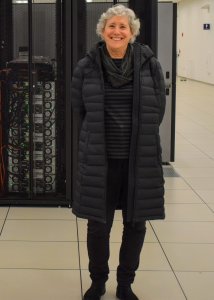Presented By: School of Information
CRITICAL x DESIGN: Apparatuses of recognition: Google, Project Maven and targeted killing
Lucy Suchman

In June of 2018, following a campaign initiated by activist employees within the company, Google announced its intention not to renew a US Defense Department contract for Project Maven, an initiative to automate the identification of military targets based on drone video footage. Defendants of the program argued that that it would increase the efficiency and effectiveness of US drone operations, not least by enabling more accurate recognition of those who are the program’s legitimate targets and, by implication, sparing the lives of noncombatants. But this promise begs a more fundamental question: What relations of reciprocal familiarity does recognition presuppose? And in the absence of those relations, what schemas of categorization inform our readings of the Other?
The focus of a growing body of scholarship, this question haunts not only US military operations but an expanding array of technologies of social sorting. Understood as apparatuses of recognition (Barad 2007: 171), Project Maven and the US program of targeted killing are implicated in perpetuating the very architectures of enmity that they take as their necessitating conditions. I close with some thoughts on how we might interrupt the workings of these apparatuses, in the service of wider movements for social justice.
About the Speaker
Lucy Suchman is Professor of Anthropology of Science and Technology at Lancaster University in the UK. Her research interests within the field of feminist science and technology studies are focused on technological imaginaries and material practices of technology design, particularly developments at the interface of bodies and machines. Dr. Suchman’s current research extends her longstanding critical engagement with the field of human-computer interaction to contemporary warfighting, including the figurations that inform immersive simulations, and problems of "situational awareness" in remotely-controlled weapon systems. Dr. Suchman is concerned with the question of whose bodies are incorporated into these systems, how and with what consequences for social justice and the possibility for a less violent world.
This lecture is also part of the ETHICS AND POLITICS OF AI series. Both series are generously supported by the School of Information; the Center for Political Studies at the Institute for Social Research; and the Science, Technology and Society program and the Department of Communication Studies in the College of Literature, Science, and the Arts.
The focus of a growing body of scholarship, this question haunts not only US military operations but an expanding array of technologies of social sorting. Understood as apparatuses of recognition (Barad 2007: 171), Project Maven and the US program of targeted killing are implicated in perpetuating the very architectures of enmity that they take as their necessitating conditions. I close with some thoughts on how we might interrupt the workings of these apparatuses, in the service of wider movements for social justice.
About the Speaker
Lucy Suchman is Professor of Anthropology of Science and Technology at Lancaster University in the UK. Her research interests within the field of feminist science and technology studies are focused on technological imaginaries and material practices of technology design, particularly developments at the interface of bodies and machines. Dr. Suchman’s current research extends her longstanding critical engagement with the field of human-computer interaction to contemporary warfighting, including the figurations that inform immersive simulations, and problems of "situational awareness" in remotely-controlled weapon systems. Dr. Suchman is concerned with the question of whose bodies are incorporated into these systems, how and with what consequences for social justice and the possibility for a less violent world.
This lecture is also part of the ETHICS AND POLITICS OF AI series. Both series are generously supported by the School of Information; the Center for Political Studies at the Institute for Social Research; and the Science, Technology and Society program and the Department of Communication Studies in the College of Literature, Science, and the Arts.